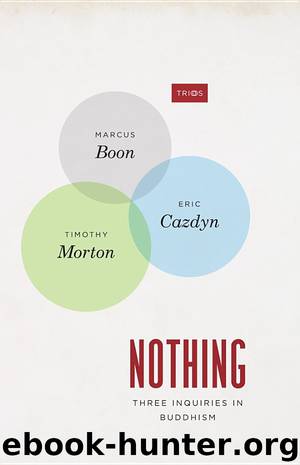Nothing: Three Inquiries in Buddhism by Marcus Boon Eric Cazdyn & Timothy Morton & Eric Cazdyn

Author:Marcus Boon, Eric Cazdyn & Timothy Morton & Eric Cazdyn [Boon, Marcus]
Language: eng
Format: epub
ISBN: 9780226233437
Publisher: The University of Chicago Press
Published: 2015-09-10T04:00:00+00:00
FREUD, CURE, AND PRAXIS
This invocation of the political unconscious takes us to our third territory: to psychoanalytic praxis and the category of cure, as well as the question of how this category can be reclaimed today alongside Buddhist enlightenment and Marxist revolution. Every key development within the history of psychoanalysis turns on a similar critique of praxis, in which Freud’s clinical practice is either criticized or defended in a way that then shapes how subsequent analysts think about and theorize psychoanalysis. It is argued, for example, that Freud did not listen carefully enough to his patients, and that his clinical skills were dulled by his commitment to theory. Also, that Freud’s theoretical speculation was compromised by his capricious experiences with a narrow demographic of patients in the clinic. And from the other direction it is argued that it was Freud himself who was the exemplary practitioner and theorist, and that those who pretend to overcome his ingenious negotiation of the problem of praxis are careerists driven by reactionary ideologies, or a simple desire to kill the father. These critiques are repeated throughout the history of psychoanalysis; younger psychoanalysts accuse the older ones of being too professionally attached to their theories and, therefore, not listening carefully and creatively enough to their patients. Jung, Klein, Winnicot, Lacan, Bion, Fromm, Kohut, Mitchell—each, in turn, not only breaks open a different way of listening in the clinic, but also produces new theoretical terms, and even styles of psychoanalytic writing, that enact this practice itself.
This struggle over the problem of praxis begins with Sándor Ferensci, one of Freud’s first intimate colleagues and disciples. Ferensci developed a critique of Freud’s lack of “mildness and indulgence,” both toward Ferensci himself (who was analyzed by Freud) and toward Freud’s other patients.92 Ferensci’s idea of a mutual analysis, in which the analyst freely expresses his or her own emotions to the patient (not only countertransferential material generated by the patient, but all types of personal disclosures of the analyst) so that both the analyst and patient can feel more secure in relation to each other, and focus on the relational dimension of the patient’s symptoms, is often recognized as a direct attack on Freud’s style, and as the ground zero of Kleinian object relations and all relational and interpersonal schools to follow. What we see with Ferensci, therefore, is the beginning of a pattern in which each plot point within the history of psychoanalysis stakes a claim on the relation between theory and practice.
But we should go back even further, to Freud himself, and to his own critique of psychiatry and that discipline’s engagement with the problem of praxis in nineteenth-century Europe. In other words, the coming-into-being of psychoanalysis was generated by Freud’s critique of psychiatry, in which the patient was viewed as a passive receptacle of illness that the doctor treated by imposing techniques and procedures irrespective of the patient’s specific life history. A hysterical symptom of aphasia, for example, might be treated by speech therapy, or even brain surgery.
Download
This site does not store any files on its server. We only index and link to content provided by other sites. Please contact the content providers to delete copyright contents if any and email us, we'll remove relevant links or contents immediately.
| African | Asian |
| Australian & Oceanian | Canadian |
| Caribbean & Latin American | European |
| Jewish | Middle Eastern |
| Russian | United States |
4 3 2 1: A Novel by Paul Auster(12354)
The handmaid's tale by Margaret Atwood(7729)
Giovanni's Room by James Baldwin(7301)
Asking the Right Questions: A Guide to Critical Thinking by M. Neil Browne & Stuart M. Keeley(5741)
Big Magic: Creative Living Beyond Fear by Elizabeth Gilbert(5726)
Ego Is the Enemy by Ryan Holiday(5392)
The Body: A Guide for Occupants by Bill Bryson(5065)
On Writing A Memoir of the Craft by Stephen King(4920)
Ken Follett - World without end by Ken Follett(4706)
Adulting by Kelly Williams Brown(4552)
Bluets by Maggie Nelson(4534)
Eat That Frog! by Brian Tracy(4500)
Guilty Pleasures by Laurell K Hamilton(4424)
The Poetry of Pablo Neruda by Pablo Neruda(4079)
Alive: The Story of the Andes Survivors by Piers Paul Read(4010)
White Noise - A Novel by Don DeLillo(3990)
Fingerprints of the Gods by Graham Hancock(3979)
The Book of Joy by Dalai Lama(3960)
The Bookshop by Penelope Fitzgerald(3827)
